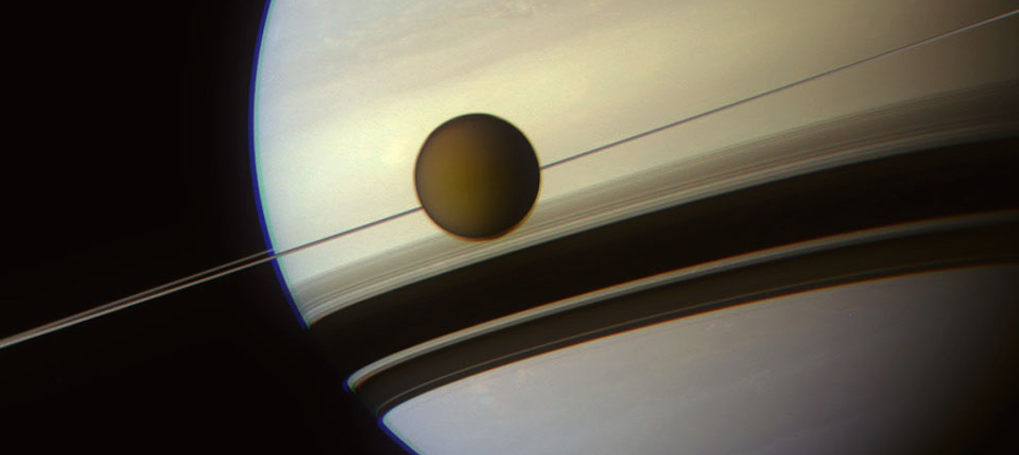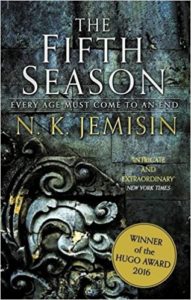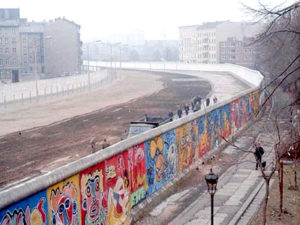
By Nick Hubble
The Fifth Season — N.K. Jemisin (Orbit)
 I wanted to begin this piece by noting that I put The Fifth Season at the top of my ballot for the Hugo last year – although this is somewhat undermined by the fact that I can no longer remember for sure if I actually voted. One time when I did actually vote was at the 2005 Glasgow Worldcon, where all that was required was posting a paper form into a ballot box in the dealers’ room. That year there was an all British shortlist suggesting perhaps that the domestic audience dominated the nomination process but also the then high international standing of British SFF. I voted for Iain M Banks’s The Algebraist, which was only on the ballot paper because Terry Pratchett had withdrawn Going Postal. The Hugo was won by Susanna Clarke’s Jonathan Strange & Mr Norrell, which I had read, loved, and placed last on my ballot because it was fantasy. In retrospect, I shouldn’t have been surprised at the result because J. K. Rowling and Neil Gaiman had won recently and, in any case, Jonathan Strange & Mr Norrell was probably the most substantial novel on that ballot. The only virtue I can now see in the decision I made at the time is that it served to reduce the difficulty of making a choice.
I wanted to begin this piece by noting that I put The Fifth Season at the top of my ballot for the Hugo last year – although this is somewhat undermined by the fact that I can no longer remember for sure if I actually voted. One time when I did actually vote was at the 2005 Glasgow Worldcon, where all that was required was posting a paper form into a ballot box in the dealers’ room. That year there was an all British shortlist suggesting perhaps that the domestic audience dominated the nomination process but also the then high international standing of British SFF. I voted for Iain M Banks’s The Algebraist, which was only on the ballot paper because Terry Pratchett had withdrawn Going Postal. The Hugo was won by Susanna Clarke’s Jonathan Strange & Mr Norrell, which I had read, loved, and placed last on my ballot because it was fantasy. In retrospect, I shouldn’t have been surprised at the result because J. K. Rowling and Neil Gaiman had won recently and, in any case, Jonathan Strange & Mr Norrell was probably the most substantial novel on that ballot. The only virtue I can now see in the decision I made at the time is that it served to reduce the difficulty of making a choice.
All of which is a long-winded way of saying that not so long ago I had a problem with fantasy not being SF but now I’ve got over that. If cutting-edge SF is all about cognitive estrangement and projecting the future to interrogate the present, fantasy is the necessary correlative for imagining alternative symbolic orders and identifying with all possible subject positions – multiple and fragmentary. It is not surprising that, within the rapid flux of dying political orders that has so far characterised the twenty-first century, SFF has rapidly gained prominence as a literature of alterity linked to progressive social politics. This is not a narrow movement or tradition: significant works range from China Miéville’s Perdido Street Station to Kameron Hurley’s God’s War, and from Gwyneth Jones’s Bold as Love sequence to Jeff Vandermeer’s Southern Reach trilogy. Arguably the most obvious example of a novel that would fit this trend from the Clarke submission list this year is The Fifth Season, which as we know is neither on the official shortlist nor the shadow jury’s alternative selection.
The reasons for this omission are probably not particularly pernicious but almost certainly a combination of factors which have cumulatively tipped the balance against its inclusion: (a) it is at the fantasy end of the SFF spectrum; (b) it is the first volume of a trilogy; (c) it is a 2015 book which was dominating discussions in 2016 rather than a year later. This last factor is, of course, a consequence of the Clarke considering books according to their British publication date. In an ideal world, however, The Fifth Season would have been in consideration for the 2016 Clarke list and might even have won the award just after winning the 2016 Hugo. While a double victory would raise questions concerning the different aims of a jury-led award in comparison to a fan-voted award, I like to think that there may occasionally be an overlap there. Call me an optimistic fool, but if you look back to the 1970s, there are books such as Ursula Le Guin’s The Dispossessed and Vonda McIntyre’s Dreamsnake which won multiple awards and catch the tenor of their times in a way that remains of interest to future readers. I suspect that future readers will look back in a similar way on Ann Leckie’s Ancillary Justice, which did win the Clarke and the Hugo, and also on The Fifth Season, which might have under different circumstances. Equally, though, I am sure there will be a future readership for more ‘literary’ as opposed to ‘genre’ books, such as Emily Mandel’s Station Eleven.
I’ve made no secret of the fact that I think an ideal Clarke list would include a mix of ‘literary’ and ‘genre’ books. I am deliberately leaving the definitions vague because I think accentuating the divisions is unnecessarily divisive. The whole point of the SF tradition is that it descends equally from the pulps and from writers such as Mary Shelley and H.G. Wells (and a similar case can be made for fantasy). It is difficult to imagine, for example, Philip K. Dick’s output without that dual heritage. This is not to say that the two strands are always in absolute sync; indeed, they go through their own cycles so that one or the other may be less vibrant at any one point and, moreover, it is clearly not the case that the relationship can never be antagonistic at times. However, history suggests that both will always find a way to renew themselves and it is difficult to see any future for SF or, indeed, SFF, that doesn’t include both strands. One could easily write a book about the interaction between a literary subjectivity and a generic intersubjectivity; how the question of what type of world is possible depends on being fully conscious of ourselves not just in our fragmented and multiple identities but also in our most common, generic characteristics.
So to turn finally to The Fifth Season itself, and also (because I have been writing this review for so long now that I have had time to read it) The Obelisk Gate, the question is how do the generic components of the novels fit in with the idea of a progressive SFF literature of alterity that embodies the possibility of social change. Furthermore, what kind of criticism serves best to reveal these features? This is a question because a simple descriptive review of the novels reduces the story to the narrative of a journey, interspersed with flashbacks, through a sequence of hostile social situations during the onset of the equivalent of a nuclear winter (caused in this case by a huge volcanic eruption). Of course, Jemisin provides an interesting set of variants on this generic structure. Her protagonist is a brown-skinned woman, Essun, in a world in which the predominantly non-white characters are carefully differentiated according to a complex set of racial markers. However, the main line of discrimination in the novels’ society is directed by the majority of people at orogenes, or ‘roggas’ as they are brutally labelled, who are those with the power to at least quell or accentuate earth tremors and, in some cases, to intervene more fundamentally in the mechanics of the earth. The elaborate social caste system that Jemisin builds around this division allows her to highlight an intersectional model of society in which Essun experiences various degrees of oppression and/or privilege as a woman and an orogene in different contexts. Moreover, Essun’s own story, which emerges through the shifting narrative structure, of her different experiences when living under different names during earlier phases of her life, serves to foreground how different social contexts and intersectional frameworks effectively shape different identities for the same individual. This complexity is welcome and, combined with strong characterisation, makes the novels into satisfying reads and yet when summarised in this way still subordinates the overall signification to the generic journey/quest narrative typical of works with infinitely less intersectional complexity, such as Cormac McCarthy’s The Road.
I pick The Road as a comparator, because it is often held up as a model for a literary version of the SF novel and because the Clarke jury tried to get the publisher to submit it for the award in the year it was eligible. Yet not only is it a very straightforward postapocalyptic tale, it is also Tolkien-like (but without the imaginative worldbuilding) in its repetitive narrative structure of crisis narrowly averted followed by conveniently-found food cache. Not only is the novel inherently misanthropic, but it is also entirely obsessed with the patriarchal father-son relationship. The message of The Road is not just the sub-Conradian position that everything outside the patriarchal order is chaotic horror but also implicitly that it would be better for everything to end irrevocably rather than for the world to continue without that patriarchal order. In comparison, The Fifth Season and The Obelisk Gate foreground a mother-daughter relationship within a post-apocalyptic scenario in order to open up and explore alternative possibilities rather than shut them down; the quest is not for a lost past but for a future we have yet to reach.
A key component of this future lies in breaking with not just the symbolic orders that structure the present but also the narrative structures, tropes and clichés that doom us to forever repeat the same old stories. This, of course, is always the problem for genre fiction because it is the combination of these features which drives story and generates meaning. Although implicit to The Fifth Season, it becomes much more explicit in The Obelisk Gate that Jemisin’s strategy for overcoming this restraint is through the quasi-metafictional inclusion of a commentary on the novels’ generic aspects. In fact, the opening sentences of The Obelisk Gate make it clear that rather than simply serving to take the story forward to the beginning of some suitably climactic final volume of the trilogy, this middle volume is deliberately revisiting and complicating aspects of the story in the first volume in order to try and break out of the generic narrative framework that has been established and generate more sophisticated meanings and possibilities:
Hmm, No. I’m telling this wrong.
After all, a person is herself and others. Relationships chisel the final shape of one’s being. I am me, and you. Damaya was herself and the family that rejected her and the people of the Fulcrum who chiselled her to a fine point. Syenite was Alabaster and Innon and the people of poor lost Allia and Meov. Now you are Tirimo and the ash-strewn road’s walkers and your dead children … and also the living one who remains.
Here, the intersubjective identities at the heart of genre fiction are foregrounded and themselves estranged by framing them within this superstructure of narration. A structure that is open to further elaboration in the third volume, because before the end of The Obelisk Gate, we are fully aware that the ‘I’ of this narration is not Essun but another character who has also had more than one name/identity across the text but who (I am speculating) might come collectively into conjunction with Essun before the end of the trilogy. Within this framing, the various communities depicted, including the exuberantly heterotopian pirate stronghold of Meov in The Fifth Season and the rather more austere and classically utopian (to the point of executing those excluded) ‘comm’, Castrima, in The Obelisk Gate, do not represent end points in the narrative but rather stages of organisation to be considered and rejected. In this respect The Broken Earth trilogy is recapitulating an evolutionary history of oppositional political organisation via banditry and the millennial commune. It will be fascinating to see where this leads to in the final volume and whether Jemisin can maintain this complex negotiation of genre limits from within genre. Furthermore, it will also be very interesting to see where she goes afterwards. In the meantime, though, I can’t help wondering if Orbit might have had more success with submitting The Obelisk Gate for the Clarke this year instead of (or even beside) The Fifth Season. Given that sequels, or loose sequels, have been shortlisted, it would have been interested to see how this novel, which is trying to do something with the trilogy format, might have fared. On the other hand, there is also a strong case for arguing that the real value of these works is only going to be apparent when the trilogy is completed and considered as a whole.
*
Nick Hubble is an academic working in the English department at Brunel University London, where they teach modern and contemporary literature, including Science Fiction and Fantasy. In addition, they have reviewed SFF for journals including Strange Horizons, Los Angeles Review of Books, Foundation and Vector.
>> Read Nick’s introduction and shortlist.
4 Comments
-
On the question of submitting The Obelisk Gate vs The Fifth Season, I think that Obelisk inevitably doesn’t stand as well alone as it will in the finished trilogy. Jemisin does an extremely good job of avoiding middle book syndrome, but you can still see where she’s getting her ducks in a row, particularly in the long stay in Castrima.
I don’t think it’s particularly necessary to make an argument about whether it is SF or not, but if it was I would say that its process of examining what you aptly call its “intersectional model of society” is thoroughly and classically SFnal.
It’s interesting how the examination of the intersections of oppression compares to The Underground Railroad, which makes its interest in that point quite clear with the early abuse and oppression of Cora by her fellow slaves. TUR took the route of making relatively limited changes to reality while pointing up just enough fantastical elements to get you to unanchor from history and consider the elements anew. Fifth Season goes for broke and constructs a new society to get you to see how it works.
-
At one point, I was considering discussing it alongside TUR for those reasons. They certainly go together well and present a linked but contrasting reading experience.
You’re probably right that The Obelisk Gate wouldn’t make any more sense (or even less sense) as a standalone than The Fifth Season – I suppose I am trying to get at the fact that it ultimately functions as a trilogy. Well, presumably anyway. We will have to see the final volume. But to the extent it includes elements of the Fifth Season, TOG shows better how the overall trilogy will pan out. Maybe the final volume will also have a chance for the Clarke.
Pingbacks
-
[…] “N. K. Jemisin’s The Fifth Season and The Obelisk Gate: a review by Nick Hubble” […]
-
[…] N. K. Jemisin’s The Fifth Season and The Obelisk Gate: a review by Nick Hubble [The Anglia Ruskin Centre for Science Fiction and Fantasy] […]


